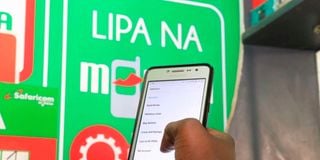M-Pesa wins as CBK says its digital shilling can wait

CBK digital shilling is seen rivalling mobile money in lowering MPesa transaction costs.
The proposed Central Bank Digital Currency (CBDC) is not a priority in the medium term, the banking sector regulator has said, and instead urged for improvement of existing innovative payment systems such as Safaricom’s M-Pesa.
The proposed Central Bank of Kenya (CBK) digital shilling, which was recently under public discussion, is seen as a competitor to mobile money down the road, especially in its ability to lower transaction costs.
The CBK however said the proposed digital shilling isn’t a priority and urged for a deeper review of factors such as transaction costs and security of the technology.
“Ultimately, the rollout of CBDC should not be a race to be first. CBK’s vision is for a payments system that is secure, efficient, and widely available to and works for Kenyans. Presently, Kenya’s pain points in payments can potentially be solved by strengthening innovations around the existing payment ecosystem” CBK said about the planned digital shilling.
“Accordingly, implementation of a CBDC may not be a priority in Kenya in the short-medium term. however, CBK will continue to monitor developments in the CBDC world and periodically assess the need for CBDC in Kenya” the regulator added.
This spells relief for M-Pesa whose share in Safaricom’s mobile service revenue has deepened to 41.5 percent as earnings from voice and text messaging came under pressure from applications such as WhatsApp.
Safaricom’s mobile service revenue in the financial year ended March 2023 grew by 4.6 percent to Sh282.23 billion, with M-Pesa accounting for Sh117.19 billion or 41.5 percent compared with 39.9 percent in the previous year.
A CBDC uses an electronic record or digital token to represent the virtual form of a fiat currency of a particular nation or region. These digital currencies are centralised and are issued and regulated by the competent monetary authority of the country.
The CBDC acts as a digital representation of a country’s fiat currency and would be backed by a suitable amount of monetary reserves like gold or foreign currency reserves.
The CBDC is, however, different from the many cryptocurrencies that have been created by different individual organisations based on some assets.
Although the CBDC has been projected to help improve financial inclusion and cross-border trade, critics warned that the technology would require the use of smartphones on the internet, leading to high costs that would be a barrier to entry.
CBK Governor Patrick Njoroge last year identified the lack of access to smartphones by more than half of mobile users in the country as one of the biggest stumbling blocks to the rollout of the CBDC.
He said the fact that the digital currency will run on 4G-enabled smartphones would hurt Kenya’s financial inclusion and effectively lock out half of the population from transacting in it.
Data by the Communications Authority that 20.52 million of Kenya’s 47.76 million internet subscriptions between October and December 2022 were on 4G technology, 11.06 million on 3G, and 15.87 million were on 2G.
The Economic Survey 2023 further shows that there were only 57,488 4G trans receivers in Kenya in 2022, having risen from 42,455 the previous year on demand for faster connectivity.
CA data also shows that the number of 5G mobile internet subscriptions hit 299,904 at the close of the first three months of commercial deployment of the technology last October, which grants users super-fast internet speeds.
Safaricom – which boasts the largest data market share – launched its 5G services on October 27, 2022--becoming the first telco to deploy the technology commercially in East Africa.





